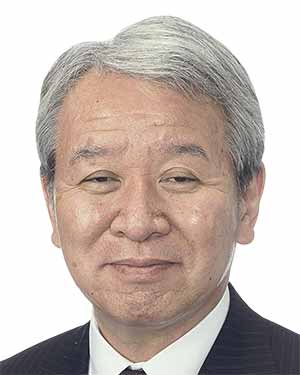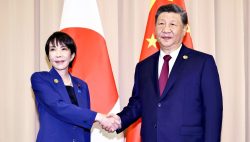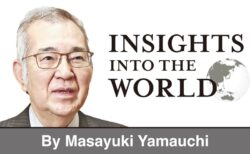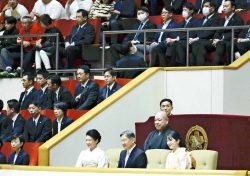11:05 JST, August 5, 2022
The eighth summit of the Tokyo International Conference on African Development (TICAD 8) will be held in the North African nation of Tunisia on Aug. 27-28. TICAD is a forum, co-organized by Japan, the United Nations, the U.N. Development Programme (UNDP), the World Bank and the African Union Commission (AUC), to discuss the theme of development in Africa.
TICAD’s principal participants are African countries first and foremost. Even so, it is true that since its inception, the Japanese government has consistently taken a leadership role in the multilateral conference. In that sense, TICAD has been and will be an important diplomatic tool for Japan.
Its inaugural summit took place in Tokyo in 1993 with Japan hosting its ensuing editions every five years through the fifth one in 2013. Then, it was agreed that TICAD would be held every three years, alternating between Africa and Japan. In 2016, Kenya hosted the first TICAD summit in Africa — TICAD 6 in Nairobi. The upcoming TICAD 8 will thus be the second of its kind to be held in Africa.
The world has transformed greatly over the three decades since TICAD came into being in the 1990s. Russia’s invasion of Ukraine, the COVID-19 pandemic and the intensification of climate change, among other issues, might have been difficult to predict 30 years ago, but they are happening in reality.
Continent with greatest potential
Against such a background, it is important to reaffirm the significance of TICAD to Japan. What meaning does Japan’s involvement in African development have for the country?
The first point of importance is the ongoing demographic trend in Africa, which is projected to experience the greatest population growth in the years ahead.
According to the United Nations’ latest estimates and projections of the global population, Africa’s total population is likely to reach 1.42 billion within this year, surpassing that of China. Moreover, in 2050 the African population is forecast to surge to 2.48 billion, far above that projected for India at 1.67 billion and China at 1.31 billion.
This demographic trend strongly suggests that Africa has the greatest potential in the world economy. For Japan, which is experiencing population contraction, Africa will undoubtedly increase its importance both as a destination for long-term investment and as a source of human resources the Japanese economy will require.
The second important point is the fact that the crises the world now faces weigh heavily upon Africa.
While the world has yet to rid itself of the COVID-19 pandemic, Russia launched its invasion of Ukraine, challenging the international order. African countries have officially announced fewer cases of infection than Western nations. But the African data shows only the tip of the iceberg. The adverse effects the pandemic has had on Africa’s health care systems are abysmal.
Economic stagnation caused by COVID-19 can create serious adverse effects on Africa. Economically vulnerable countries on the continent are experiencing serious retrogression in many of their targets relating to the U.N. Sustainable Development Goals (SDGs).
In Africa, the percentage of people suffering from “extreme poverty” — living on less than $1.90 a day — had been on the decrease until the pandemic broke out. However, in 2020, an estimated 55 million people there were pushed back into extreme poverty. What is more, if Russia’s invasion of Ukraine keeps disrupting food and fertilizer supplies from these two countries in conflict, Africa is feared to face harsh food shortages.
Why now?
Why should Japan now show proactive interest in Africa, which is plagued by multiple crises?
In response to Russia’s reckless aggression against Ukraine, many countries in the world have chosen to actively support the Ukrainians in distress. European countries are sharing a large proportion of assistance to Ukraine, despite the fact that Europe itself is suffering from the consequences of the war in Ukraine, such as fuel price spikes.
Japan has also extended considerable amounts of emergency financial and humanitarian assistance to Ukraine. But Japan’s policy does not allow it to provide Ukraine with any military assistance. Is it not a fair division of labor for Japan to help other regions that are suffering from the negative impacts of the war in Ukraine?
Now that Africa, which has great potential in the long term, is faced with difficulties, TICAD 8 can be an opportunity to manifest that Japan is a true partner of Africa.
What is crucial in this regard is that Japan-Africa cooperation should not be limited to short-term measures of crisis responses. Together with African countries and international organizations, Japan should explore a path of long-term development that fully realizes Africa’s great potential. The keyword for this approach is the concept of “resilience.”
Once “resilience” is ingrained, it becomes possible to forestall a chain of crises and ensure “human security” in the event of a short-term crisis.
Today’s Africa, for instance, depends on imports for its main grain consumption. Despite its abundant natural resources, its manufacturing sector has not yet been sufficiently developed. Its fundamental health care systems are still vulnerable, as evidenced by the high maternal and infant mortality rates there.
The past TICAD sessions have addressed those issues. For example, a project to double rice production in Africa in about 10 years has been progressing well. A program Japan originally launched in Kenya to help smallholder farmers improve productivity is now being implemented in other African countries.
Likewise, the kaizen (deepening of quality and productivity improvement) campaign Japan initiated to help strengthen Ethiopia’s manufacturing sector has now been introduced into other African countries. The same holds for other Japanese endeavors in Africa, including the boshi-techo (maternal and child health handbook) promotion initiative and the kaizen practices program for hospitals.
Building resilience
During TICAD 8, Japan should renew its efforts to persuade as many African countries as possible to exert themselves to build resilience.
There is also a need to promote innovation to leapfrog in many aspects of development in Africa. Africa’s information and communication technology (ICT) infrastructure remains less advanced. Still, in many parts of Africa, innovative ideas are beginning to be implemented to transform society. Africa is at the forefront of such innovation. Many ambitious African entrepreneurs joined a JICA hosted competition awarding excellent start-up businesses.
The role of the private sector has been emphasized in the TICAD process since TICAD 5 held in 2013. African leaders have been calling for “more investment than assistance.”
Global data shows that Africa-bound direct investment has been on the increase. Regrettably, however, Japan’s corporate investment in Africa remains at low levels. This may reflect a lingering perception in Japan that Africa is too distant. Nonetheless, a close look at Africa’s potential makes it too compelling for Japan to keep turning its back on the continent.
When the world is crisis-stricken, risks associated with Africa may appear big. But, look at young African entrepreneurs setting up startups of their own. You can clearly see that the future development of Africa is budding among them.
Japan has been promoting a “free and open Indo-Pacific” vision. Africa is located at the western rim of that vast region. Today, the international order is being hugely shaken and Africa is facing serious challenges. A friend in need is a friend indeed. Now is the time for Japan to demonstrate that it is a friend indeed of Africa.
TICAD 8 is the big stage for Japan and Africa to reinforce the friendship network between them.

Akihiko Tanaka
Tanaka is president of the Japan International Cooperation Agency (JICA), a post he took up in April for the second time after his first stint in that position in 2012-15. He served as president of the Tokyo-based National Graduate Institute for Policy Studies (GRIPS) from 2017 to March 2022. Previously, he was vice president of the University of Tokyo from 2009 to 2012.
Top Articles in Editorial & Columns
-

40 Million Foreign Visitors to Japan: Urgent Measures Should Be Implemented to Tackle Overtourism
-

China Criticizes Sanae Takaichi, but China Itself Is to Blame for Worsening Relations with Japan
-

Withdrawal from International Organizations: U.S. Makes High-handed Move that Undermines Multilateral Cooperation
-

University of Tokyo Professor Arrested: Serious Lack of Ethical Sense, Failure of Institutional Governance
-

Defense Spending Set to Top ¥9 Trillion: Vigilant Monitoring of Western Pacific Is Needed
JN ACCESS RANKING
-

Univ. in Japan, Tokyo-Based Startup to Develop Satellite for Disaster Prevention Measures, Bears
-

JAL, ANA Cancel Flights During 3-day Holiday Weekend due to Blizzard
-

Japan Institute to Use Domestic Commercial Optical Lattice Clock to Set Japan Standard Time
-

China Eyes Rare Earth Foothold in Malaysia to Maintain Dominance, Counter Japan, U.S.
-

Japan, Qatar Ministers Agree on Need for Stable Energy Supplies; Motegi, Qatari Prime Minister Al-Thani Affirm Commitment to Cooperation

























